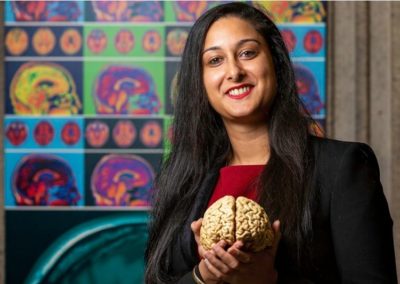Your brain is the most precious and complex organ in your body, and it makes you who you are. Unlike some of your other vital organs, it can’t be repaired or replaced if it becomes diseased or wears out. Fortunately, writes Professor Cathy Stinear, there are things you can do to keep it sharp.
1. Move it
The simplest thing you can do for the health of your brain is take it for a walk on a regular basis. Being physically active improves blood flow to your brain, even when you’re resting. People sometimes think that their bodies need physical training and their brains need mental training. But your brain is just like the rest of your body – it needs regular physical activity to be healthy. Puzzles and crosswords are fun, and with practice you’ll get quite good at them. But these skills don’t really help with your thinking and memory in your daily life. So it’s important to prioritise physical activity over crosswords and puzzles. If you enjoy puzzles, then keep doing them as a reward after you’ve gone for a walk, been for a swim or worked in the garden.
2. Rest it
We all know how hard it can be to think straight the morning after a night of disrupted sleep. While the occasional bad night won’t do much harm, long-term disruptions to sleep quality and quantity have negative effects on brain health. Sleep is when waste products, including proteins linked to the development of dementia, are removed from the brain. The lymphatic system that removes these waste products was only discovered about a decade ago and is most active while we sleep. So, give your brain the chance to do its daily housekeeping with habits that give you the quality and quantity of sleep that you need.
3. Feed it
The basic principles of healthy eating are very simple. To quote Michael Pollan: “Eat food. Not too much. Mainly plants.” Real foods are those your grandmother would recognise, made from ingredients you can pronounce. A balanced diet high in fresh, unprocessed foods, and low in salt and sugar, is good for your body and your brain. Beware the superfoods and supplements that make claims about improving brain health. There’s no magic ingredient. A balanced diet that keeps your body healthy is the best thing for your brain.
4. Challenge it
Being curious about the world and learning new things gives your brain practice at forming new connections and memories. Connecting what you’re learning with what you already know can lead to new insights and understanding. Whether it’s learning about viruses, a new language like te reo Māori, how to bake or how to ride a motorbike, you’re using a wide range of thinking skills and keeping them sharp. It’s never too late to learn something new.
5. Protect it
There’s no such thing as a mild concussion. All head knocks are serious because they can have long-term effects such as fatigue, poor concentration and depression. So, always wear headgear on the rugby field, and a helmet for cycling, scootering, skateboarding, motorsport and horse riding. If you have a head knock, follow your doctor’s advice for reducing the risk of further head injuries to avoid cumulative negative effects. Think about noise injury, too. Your hearing can be damaged by long-term exposure to loud noise at work or recreationally, or by short-term exposure to loud music at a concert, for example. Regardless of the cause, hearing loss is associated with an increased risk of cognitive decline. So, protect your hearing and protect your head.
6. Breathe
This seems obvious. Most of us don’t have to think about breathing. But taking a few minutes each day to pay attention to your breathing is a simple way to calm your mind and manage stress. Mindfulness practices for stress reduction can improve cardiovascular health, which, in turn, is good for brain health. Smoking and vaping are some of the worst things you can do for your brain. So, get help to quit or, better yet, don’t start.
7. Play
Have fun. Connecting with friends and having a laugh are some of the simplest things we can do for our mental and emotional well-being. Social connection is essential for good brain health, too. Getting together with friends makes being active, eating well, and learning new things much more fun. Yes, it was a challenge during the Covid-19 lockdown, but that’s made us realise how important it is.
– Professor Cathy Stinear is a neuroscientist in the Faculty of Medical and Health Sciences and a member of the University of Auckland’s Creative Thinking Board. She is a Principal Investigator at Brain Research New Zealand.
This article first appeared in the Winter 2020 edition of Ingenio magazine.



